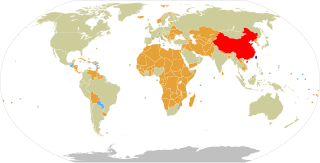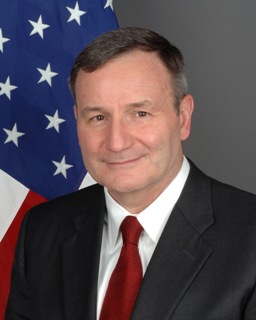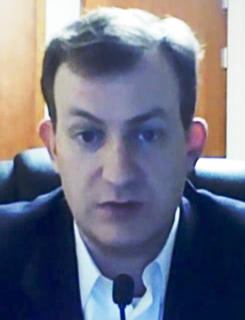
Foreign relations of Kazakhstan are primarily based on economic and political security. The Nazarbayev administration has tried to balance relations with Russia and the United States by sending petroleum and natural gas to its northern neighbor at artificially low prices while assisting the U.S. in the War on Terror. Kazakhstan is a member of the United Nations, Organization for Security and Co-operation in Europe, North Atlantic Cooperation Council, Commonwealth of Independent States, the Shanghai Cooperation Organisation, and NATO's Partnership for Peace program. Kazakhstan established a customs union with Russia and Belarus, transformed into the Eurasian Economical Community then in 2015 into the Eurasian Economic Union. President Nazarbayev has prioritized economic diplomacy into Kazakhstan's foreign policy.

The Republic of China (ROC), referred to by many states as "Taiwan", is recognised by 16 out of 193 United Nations member states, as well as the Holy See. These diplomatic relations do not constitute an international acceptance of Taiwan as a state, but rather represent a recognition of the ROC government as the representative of "China", which means that in the perspective of these countries, the Republic of China is "China", rather than the People's Republic of China, despite the fact that the ROC's controlled area is only less than 1% of "China". In addition to these relations, the ROC maintains unofficial relations with 57 UN member states via its representative offices and consulates. The ROC passport has 124 countries and Hong Kong reciprocally exchange visa exemption agreements as of 2018.

Asia-Pacific Economic Cooperation (APEC) is an inter-governmental forum for 21 Pacific Rim member economies that promotes free trade throughout the Asia-Pacific region. Inspired from the success of Association of Southeast Asian Nations (ASEAN)’s series of post-ministerial conferences launched in the mid-1980s, the APEC was established in 1989 in response to the growing interdependence of Asia-Pacific economies and the advent of regional trade blocs in other parts of the world; and to establish new markets for agricultural products and raw materials beyond Europe. Headquartered in Singapore, the APEC is recognised as one of the oldest forums and highest-level multilateral blocs in the Asia-Pacific region, and exerts a significant global influence.

The Colombo Plan is a regional organisation that represents a collective intergovernmental effort to strengthen economic and social development of member countries in the Asia-Pacific region. The primary focus of Colombo Plan activities is on the development of human resources in the region.

The economy of Asia comprises more than 4.5 billion people living in 49 different nations. Six further states lie partly in Asia, but are considered to belong to another region economically and politically. Asia is the fastest growing economic region, as well as the largest continental economy by both GDP Nominal and PPP in the world. China, Japan, India, South Korea and Indonesia are currently the top five economies in Asia. Moreover, Asia is the site of some of the world's longest modern economic booms, starting from the Japanese economic miracle (1950–1990), Miracle on the Han River (1961–1996) in South Korea, economic boom (1978–2013) in China and economic boom in India (1991–present).
The Pacific Century is a term that has been used to describe the 21st century through analogy with the term American Century. The implicit assumption underlying the usage of the term is that the 21st century will be dominated, especially economically, by the states in the Asia-Pacific region, in particular China, Japan, India, South Korea, Taiwan, the ASEAN members, Australia, Russia, Canada, Mexico, and the United States. This idea can be compared to the historical Eurocentric/Atlantic viewpoint, which has dominated for the past two centuries.
Russell Brunell Trood was a Liberal Party Senator for the state of Queensland, Australia. His surprise election as the third Liberal from Queensland in the 2004 Federal Election, along with 38 other Coalition Senators gave the federal government of John Howard a majority in the Senate and thus control of both houses of Parliament. He did not retain his seat in the 2010 Australian federal election. His term in the senate ended on 30 June 2011.

In the United States Government, the Bureau of East Asian and Pacific Affairs is part of the United States Department of State and is charged with advising the Secretary of State and Under Secretary of State for Political Affairs on matters of the Asia-Pacific region, as well as dealing with U.S. foreign policy and U.S. relations with countries in that area. It is headed by the Assistant Secretary of State for East Asian and Pacific Affairs, who reports to the Under Secretary of State for Political Affairs.

The IISS Asia Security Summit: The Shangri-La Dialogue (SLD) is a "Track One" inter-governmental security forum held annually by an independent think tank, the International Institute for Strategic Studies (IISS) which is attended by defense ministers, permanent heads of ministries and military chiefs of 28 Asia-Pacific states. The forum gets its name from the Shangri-La Hotel in Singapore where it has been held since 2002.
The Pacific Economic Cooperation Council (PECC) is a network of member committees composed of individuals and institutions dedicated to promoting cooperation across the Asia Pacific region, headquartered in Singapore. PECC has 23 full member committees Australia; Brunei Darussalam; Canada; Chile; China; Colombia; Ecuador; Hong Kong; Indonesia; Japan; Korea; Malaysia; Mexico; Mongolia; New Zealand; Peru; the Philippines; Singapore; Taiwan; Thailand; the United States; Vietnam and the Pacific Island Forum, one associate member: France, and 2 institutional members: Pacific Trade and Development Conference (PAFTAD) and the Pacific Basin Economic Council (PBEC).

The Centre for Strategic and International Studies (CSIS) is a non-profit organization based in Indonesia which has served as a think tank on social, international, political and economical issues. CSIS was founded on Sept 1, 1971 by a group of Indonesian colleagues who hoped to promote public policy-oriented discussions in Indonesia. Founders of the organization included Harry Tjan Silalahi, Jusuf Wanandi, Hadi Soesastro, and Clara Joewono. It also had strong support from key figures close to the government at the time including generals Ali Moertopo, Soedjono Hoemardani, and Benny Moerdani. It was founded to give advice, ideas and support to government and other stakeholders such as parliament, political parties, businesses and NGOs and to reach out to the regional and international communities and to develop awareness of Indonesian policies and its state of development, while giving feedback to the Indonesian government on domestic and international developments.
The S. Rajaratnam School of International Studies (RSIS) is an autonomous Singapore graduate school and policy-oriented think tank within the Nanyang Technological University (NTU). Known earlier as the Institute of Defence and Strategic Studies when it was established in July 1996, RSIS offers graduate education in international affairs, taught by an international faculty. The school is named after Singapore's former Deputy Prime Minister, the late S. Rajaratnam.
Not to be confused with Peter Cozzens

India's Look East policy is an effort to cultivate extensive economic and strategic relations with the nations of Southeast Asia in order to bolster its standing as a regional power and a counterweight to the strategic influence of the People's Republic of China. Initiated in 1991, it marked a strategic shift in India’s perspective of the world. It was developed and enacted during the government of Prime Minister Narsimha Rao (1991–1996) and rigorously pursued by the successive administrations of Atal Bihari Vajpayee (1998–2004) and Manmohan Singh (2004–2014). Currently Prime minister Narendra Modi is taking policy to next level as Act East Policy.

Karl Winfrid Eikenberry is a retired United States Army lieutenant general who served as the U.S. ambassador to Afghanistan from April 2009 to July 2011. He is currently the Oksenberg-Rohlen Fellow and Director of the U.S. Asia Security Initiative at the Walter H. Shorenstein Asia-Pacific Research Center. He is also a Stanford University professor of the practice; a member of the Core Faculty at the Center for International Security and Cooperation; and an affiliated faculty member at the Freeman Spogli Institute for International Studies, Center on Democracy, Development and the Rule of Law, and The Europe Center.

Anthony Crothers MilnerAM is an Australian historian of Southeast Asia – concerned primarily with the history of ideas – and a commentator on Australia-Asia relationships. His writings on Malay history and society – and the history of Islam in Southeast Asia – include Kerajaan: Malay Political Culture on the Eve of Colonial Rule (1982), an interdisciplinary (history/anthropology) study, published in a new edition in 2016. He is also co-editor of the series of volumes, Australia in Asia, which examine the role of culture and values in Australia-Asia relationships; and of the Asialink report on Australia-ASEAN relations, Our Place in the Asian Century: Southeast Asia as the Third Way (2012). Milner is professorial fellow and international director at Asialink, The University of Melbourne, and visiting professor at the Asia-Europe Institute, University of Malaya. He was dean of Asian studies at the Australian National University (1996–2005), and Basham Professor of Asian History (1924-2013). He is now emeritus professor of the Australian National University.
The Singapore Institute of International Affairs is a non-government think tank based in Singapore. The Institute conducts research, hosts events, and plans conferences that deal with pressing issues in international affairs, with special focus on South East Asia. It is the oldest think tank in Singapore and it was founded in 1961.

Pacific Forum is a Honolulu-based foreign policy research institute focused on the Asia-Pacific that is formerly a subsidiary of the Center for Strategic and International Studies (CSIS), headquartered in Washington, DC. Founded in 1975, the Pacific Forum collaborates with a broad network of research institutes from around the Pacific Rim, drawing on Asian perspectives and disseminating project findings and recommendations to global leaders, governments, and members of the public throughout the region.
Kent E. Calder is a distinguished Edwin O. Reischauer Professor. He is the Director of the Japan Studies Program at the Paul H. Nitze School of Advanced International Studies (SAIS), and the Director of the Edwin O. Reischauer Center for East Asian Studies.

Robert E. Kelly is an American political analyst on inter-Korean affairs and associate professor in political science at Pusan National University. In March 2017, he and his family rose to fame when his live interview on the BBC was sequentially gatecrashed by his children and wife.















